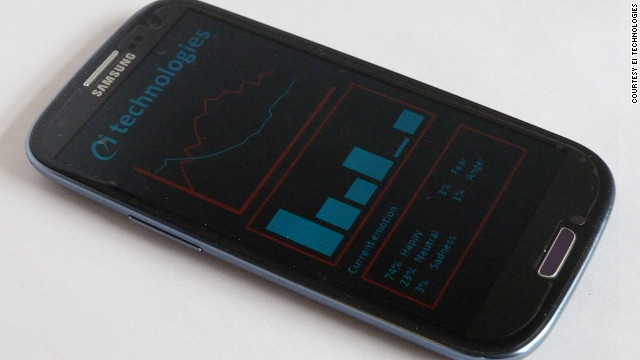
A British firm is developing an app that will allow smartphones to track their owners' moods through their speech patterns, in the hope it can improve aspects of mental health treatment.
The app, known as
Xpression, will record the user's voice throughout the day, whether they
are making a phone call or not, analyzing the acoustics for emotional
content.
Matt Dobson, co-founder of EI Technologies,
said the app was designed to provide a more objective, reliable record
of patient's emotions than "mood diaries" currently used in the
treatment of people with anxiety, depression or stress.
"Over half of adults in
the UK suffer from severe stress once or twice a week so there's a lot
of opportunity in the market," he said.
"I wanted to know: could
we bring something into the market that would help people sort out their
stress and depression and anxiety? ... I found that voice-based
recognition was something that would work on a smartphone."
Psychologists often ask
patients to keep track of changes in their emotional state by noting
them down in mood diaries, he said, but medical literature suggests only
30-50% of patients provided enough information in their diaries to be
useful in treatment.
"This replaces that old technology. This is the turbo-charged version of manually recording your emotions," he said.
Tracey Parsons, a
clinical psychologist working as clinical adviser on the project, said
the major problem with mood diaries was that people simply don't fill
them in.
"They don't believe
they'll be useful and it's too much of a hassle, or they're so unable to
recognize their own feelings that they struggle to complete them," she
said.
The app, which would
activate when it recognized the user's voice, would provide the patient
and psychologist a more complete record of changes in emotion and mood,
allowing the patient to get a better sense of their emotional triggers.
"It's useful to have
that to allow you to think: 'How did I react? What was I thinking? Why
did I get so angry about it?'" says Parsons.
"This would allow for
more effective use of mental health services, making the app a
potentially attractive proposition for health systems around the world,"
she said.
The app does not record
the speaker's words, said Dobson, but rather monitors the acoustic
elements of their speech -- such as volume, intensity, pace and pitch --
to take an emotional reading.
"We look for acoustic features within your words. We don't know what you're saying," he said.
Snapshots of the user's
acoustic patterns were sent to a remote server, where the user's
emotional state would be calculated by a machine-learning system.
Professor Stephen Cox,
head of the speech processing laboratory at the University of East
Anglia and scientific adviser to the project, said the technology was
made possible due to advances in machine-learning algorithms.
"This is an area called
paralinguistics where one is extracting things from the voice which are
not said verbally but convey meaning -- one being emotion," he said.
"All we need to do is
collect lots of angry speech or happy speech. We show them to the
classifier and the algorithm sorts it out."
Dobson said one of the
biggest unknowns facing the project was how willing patients would be to
expose themselves to constant monitoring through their phones -- even
though only data relating to the acoustics, rather than the words
themselves, would be recorded.
"What we don't know is: 'How intrusive is that? What's the trust required to do this?'"
However, he saw the app
as belonging to a group of existing smartphone products that monitored
the human body, such as jogging or sleep monitors, which had gained
widespread acceptance. The apps were a product of the "Quantified Self"
movement, which saw users employ self-tracking technologies to gain a
better sense of how their bodies responded to different inputs.
He said if a consumer
version of the app was released, targeting those interested in
self-tracking, it could hit the market in the second half of the year.
An app suitable for use by mental health services would take a little
longer due to testing requirements, he said.
Source : Edition CNN , London ( 26th feb 2013 )

No comments:
Post a Comment